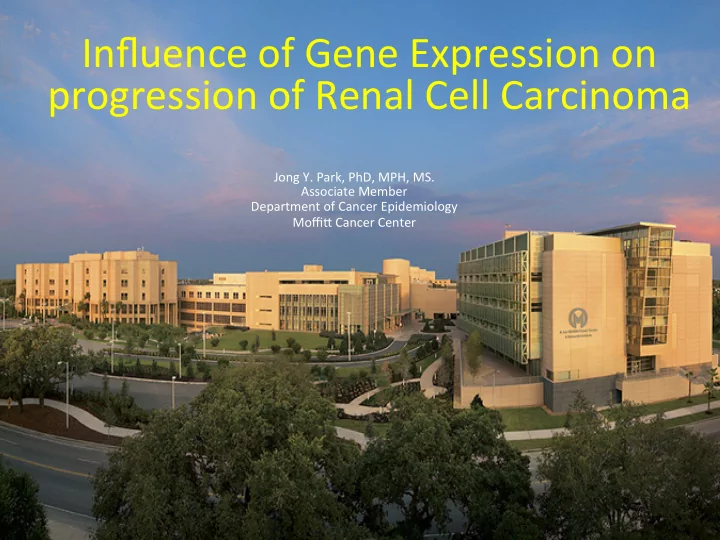

Influence of Gene Expression on progression of Renal Cell Carcinoma Jong Y. Park, PhD, MPH, MS. Associate Member Department of Cancer Epidemiology MoffiH Cancer Center
Disclosure • None
Objectives • Descriptive Epidemiology of RCC • Rationale for outcome biomarkers predicting prognosis • Tentative biomarkers for prognosis of RCC
Trend of incidence and mortality
High Incidence in Men
High Incidence in Men
High Mortality in Men
Distribution of Stage and survival
Risk Factors Smoking contributes to 25% of RCC cases -Smoking increased risk 2X Environmental: Cadmium, thorium-di-oxide, petroleum and phenacetin Occupational: Leather tanners, shoe workers, asbestos workers Obesity High blood pressure Long term dialysis 12
RCC incidence rates
Genetic Risk Factors • Von Hippel-Lindau syndrome • Birt-Hogg-Dube syndrome • Hereditary papillary RCC • Hereditary leiomyomatosis
Treatment • Surgery • Radiation therapy • Immunotherapy • Active surveillance
Biomarkers for prognosis • ~35-40% of patients with localized ccRCC at time of surgery will experience metastasis • Reliable prognostic biomarkers are urgently needed to improve survival and patient care
Three independent cohorts 1. TCGA (n=440) 2. Total Cancer Care (TCC) (n=547) 3. Moffitt cohort (n=384)
Three independent cohorts 1. TCGA (n=440) 2. Total Cancer Care (TCC) (n=547) 3. Moffitt cohort (n=384) • 400 candidate genes were selected from preliminary study and literatures. • These genes were known to be associated with RCC progression
TCGA • A total of 440 ccRCC patients were used in this work • 146 out of 400 candidate genes were associated with survival in TCGA dataset based on the following three criteria 1) Transcripts were identified in any protein-coding region. 2) Transcript sequences have been annotated in GENCODE project. 3) Transcripts were expressed in at least half of the ccRCC samples.
TCC • Under the Total Cancer Care (TCC) protocol, 547 ccRCC tumor tissues were collected at the Moffitt Cancer Center. • Global gene expression assays were performed using a custom Affymetrix HuRSTA GeneChips. • 139 out of 400 genes were associated with recurrence in TCC dataset
Genes associated with progression TCC TCGA 52 94 87 169
Genes associated with progression TCC TCGA 52 (47) 94 (26) 87 (7) 169 (1)
Study Design Test 400 candidate genes TCGA (n=440) TCC (n=547) Validate 81 idenXfied genes MoffiH (n=384)
Moffitt cohort • Historical cohort of 1,368 RCC cases treated at the MoffiH Cancer Center from 1998 to 2013 • 384 paXents were selected (aggressive vs indolent) • Expression level of 81 genes in 384 tumor Xssues was evaluated with Nanostring assay
81 candidate genes ABCC1 CDH1 HSPB1 RAPGEF5 ABCG2 CDKN2A IGF1R ROR1 ALOX5 CDKN2B ITGA6 RPL13A AMD1 CEP290 JAG1 SAA1 ANXA2 CORO6 JAK1 SLC22A2 APC CTDSPL JUP SLC5A8 AR CXCR4 KDR SLC6A3 ASPSCR1 CYBA KLF4 SMAD4 AURKA ENO2 MANF SOCS3 AURKB ESR1 MKI67 SOD2 AXL ETS1 MMP3 SPINK1 BCL2 FAM107A MMP9 SPRY1 BHMT FNIP2 MPZL2 TEK BIRC5 FTL MSTO1 TFAP2A BRAF FZD4 MYCN TGFBR3 BTG3 GAPDH MYO6 TGM2 C3 GNL3 PLOD2 THRB CCND1 HDAC1 PPIA TOP2A CCNE1 HLF PRDX6 TPPP CD151 HPX RAD23B UBE2S WASF2
KM1TCGA <0.05
KM2TCGA
KM3TCGA
KM4TCGA 5 Genes >0.05
KM1TCC
KM2TCC
KM3TCC
KM4TCC 22 Genes >0.05 in either TCC or TCGA
Boxplot1 MoffiH
Boxplot2 MoffiH
Boxplot3 MoffiH
Boxplot4 MoffiH
Boxplot5 MoffiH 30 Genes >0.05 in either TCC or TCGA
Validation data
Validation data
10 candidate biomarkers ABCG2 AURKA AURKB BCL2 BIRC5 CCNE1 GAPDH ITGA6 SAA1 TOP2A
Summary RCC is relatively rare but increasing incidence Associated with tobacco and inherited disorders Surgery is the major curative modality for Stage I, II, and III We identified 10 genes expressed differentially between indolent and aggressive cases. 42
Acknowledgements Moffitt Cancer Center Park’s lab Thomas Sellers, PhD Hyun Park, MS Julio Pow-Sang, MD Selina Radlein, MPH Anders Berglund, PhD Ernest Amankwah, PhD Jasreman Dhillon, MD Youngchul Kim, PhD Philip Spiess, MD Wade Sexton, MD Mayo Florida Alex Parker, PhD LSU Hui-Yi Lin, PhD
Natural History 7% diagnosed incidentally 45% present with localized disease, 25% with locally advanced disease, 30% with metastatic disease Distant metastases- lung (75%), soft tissue (36%), bone (20%), liver (18%), skin (8%) and CNS (8%) incidence and mortality rates of RCC are increasing in the United States 45
Renal Cell Carcinoma First described by Konig in 1826. In 1883 Grawitz, noted the fatty content of cancer cells similar to that of adrenal cells. All these tumors arise from Renal tubular epithelium. accounts for 80–85% of kidney cancer 2% to 4% increase in incidence per year 46
Epidemiology Male predominance (1.6:1.0 M:F) Highest incidence between age 50-70 -Median age of diagnosis is 66 years -Median age of death 70 years Majority of RCC occurs sporadically Highest incidence in Scandinavia and North America, lowest in Africa 47
Two Approaches for Molecular Epi. Studies • Candidate Pathway • Genome Wide Association
Candidate Pathway Approach
Case-Case Study Design PCa paXents who had a recurrence PCa patients who are a_er treatment. recurrence-free at least 5 years after treatment
Management of Localized disease Localized Disease Surgery Radio Therapy 51
MoffiH Cohort • We select 384 paXents at MoffiH Cancer Center who were treated surgically for ccRCC between 1990 and 2005, and total RNA was isolated from FFPE Xssue blocks • The NanoString pladorm was used to quanXfy gene expression of 81 candidate genes, were idenXfied by TCC and TCGA data.
Results from TCGA and TCC • Analysis of 400 candidate genes, were selected from our preliminary study and literatures were evaluated whether they are differenXally expressed and associated with survival using RNA-seq data of 537 ccRCC paXents from the TCGA data portal or Affymatrix data for 547 paXents from TCC. 94 and 87 genes were idenXfied using staXsXcal P-values TCGA and TCC data. Among genes idenXfied from two data set, 52 genes were detected from both data.
167 (1) 52 (47)
TCC (n=547) Test 195 candidate genes TCGA (n=533) Validate idenXfied genes MoffiH Confirm idenXfied genes
Test 400 candidate genes TCGA (n=533) TCC (n=547) Validate 81 idenXfied genes MoffiH (n=384) 8 idenXfied genes
Recommend
More recommend